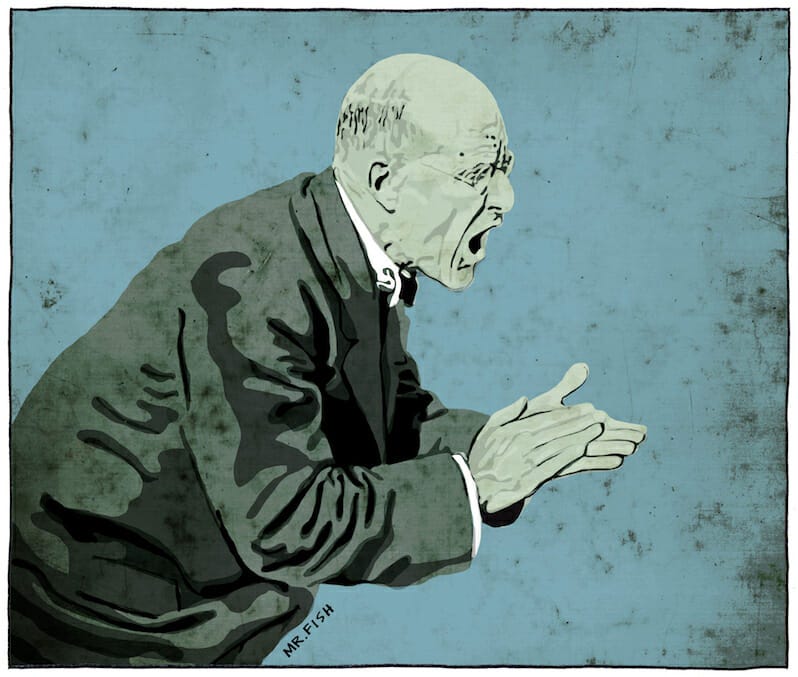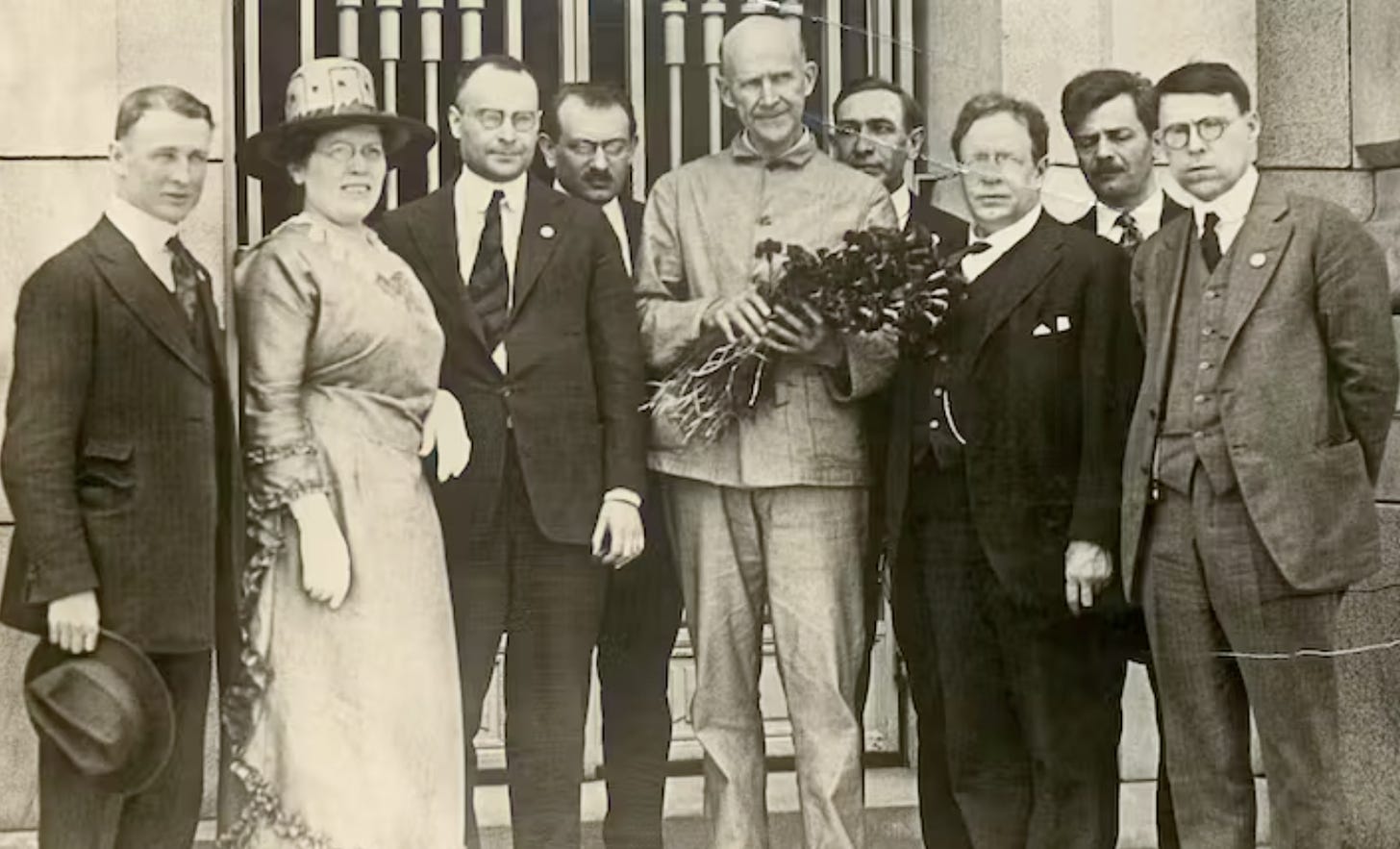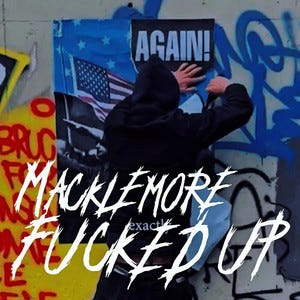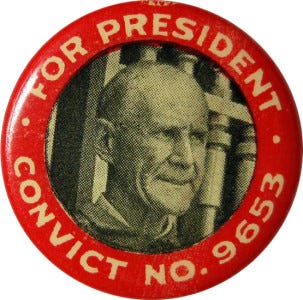Macklemore's Collab with Convict No. 9653
Exploring the Humanistic Significance of Macklemore's Revolutionary New Song, "Fucked Up"
Few major contemporary musicians are deploying their creative talents to analyze and decry systematic oppression the way multi-platinum-selling hip-hop artist Macklemore is. Macklemore's new song “Fucked Up” is a timely and radical assessment of our political moment. It is also a frenetic call to action.
The song begins with an epigraph by the American Eugene V. Debs: “The most heroic word in all languages is revolution.” Considering Macklemore’s status as a widely acclaimed and commercially successful musician,1 his mention of Debs is noteworthy in itself given how few in the U.S. know the 20th century socialist.
Debs ran for president as a candidate of the Socialist Party of America five times in the early 20th century. In his fifth and last presidential bid, in 1920, Debs—convict no. 9653—garnered more than 900,000 votes and just over 3 percent of the vote. His candidacy was all the more significant given he was serving a prison sentence during the election.

Debs was sentenced to ten-years in prison for his June 16, 1918 speech in Canton, Ohio, against World War I. After visiting three socialists jailed for their opposition to the draft, Debs walked to a nearby socialist convention where he gave a two-hour speech praising the draft resisters. “The master class has always declared the wars,” Debs told his audience, “the subject class has always fought the battles.” The demand of the subject class—working people—to fight was accompanied by indoctrination. “They have always taught and trained you to believe it to be your patriotic duty to go to war and to have yourselves slaughtered at their command.” But the only legitimate war worth fighting, Debs argued, was a war declared by the people tasked with waging it.
Debs’ avowed effort to obstruct the nation’s war effort was criminalized under the 1917 Espionage Act and amendments made under the Sedition Act of 1918. The Selective Service system, tracking and registering military-age men in case of a draft, began the same year the Espionage Act was passed. Debs was acutely aware of the risks of speaking in support of his fellow socialists and against the war. During the Canton, he defiantly told the crowd, “I would rather a thousand times be a free soul in jail than to be a sycophant and coward in the streets.” Less than a year later, on April 13, 1919, Debs began a prison sentence for his anti-war speech. The sentence was commuted by President Warren G. Harding on December 23, 1921, more than two years after Debs entered jail.
Macklemore’s song quotes Debs' April 27th, 1907 essay, “Revolution,” first published in the New York Worker. In the essay, which commemorated International Labor Day—May 1st—Debs explained that the word “revolution” “thrills and vibrates; cheers and inspires. Tyrants and time-servers fear it, but the oppressed hail it with joy.” Revolution as a vehicle for human liberation and the defense of dignity has clearly inspired Macklemore.
“Fucked Up’s” official music video opens up with imagery of Zül-Qarnaįn Nantambu holding up a Sudanese and Palestinian flag with the words Sudan and Gaza written on it during the Kendrick Lamar Super Bowl halftime performance. Nantambu felt morally compelled to use his opportunity as a participant in the show to bring attention to the suffering and devastation the people of Sudan and Gaza are being subjected to.

Spotlighting the 2025 Superbowl protest was a fitting start to the music video. Macklemore was among the earliest high-profile musicians and celebrities to speak out against the military onslaught in Gaza, giving an impromptu speech before hundreds of thousands gathered to call for peace during a November 4, 2023 march in Washington, D.C.
The video’s choice of opening imagery was also apt given Macklemore's challenge to artists to use their creativity and platform for the cause of justice rather than petty squabbles. In “Hind's Hall,” a timely protest song calling for the liberation of Palestinians and an end to the siege of Gaze, Macklemore asks, “What happened to the artists, what d’you got to say?” He then makes a not-so-subtle swipe at Kendrick Lamar’s creative priorities. “I want a ceasefire, fuck a response from Drake.” In 2025, Lamar won five Grammy Awards for his song “Not Like Us.” Macklemore's song protesting genocide in Gaza was not nominated.
Macklemore begins “Fucked Up” by stating, “Stand for something or fall for anything.” He then addresses the historic fires that engulfed Los Angeles, California in 2025. Beyond the catastrophe of the fires, Macklemore leads listeners to connect the dots of power, noting underlying questions of resource ownership and how exploited laborers were used to combat the flames. “The world's on fire / we don't own the water, y'all / inmates hired for a couple dollars ya'll.”
Macklemore challenges listeners to recognize that white supremacy has not been eradicated, it has just taken a new form. “Talkin' colonizing Gaza from the White House lawn,” raps Macklemore against images of President Donald Trump and Israeli Prime Minister Benjamin Netanyahu’s meeting in February 2025. During the meeting, Trump stated that the U.S. would “own” Gaza and envisioned turning it into the “Riviera of the Middle East.” During a later Fox News interview, Trump was asked if Palestinians forced to leave Gaza would be permitted to return. “No, they wouldn't,” he answered.
“Fucked Up” tracks the growing discontent with the trajectory of American political power including spontaneous nationwide protests of President Trump’s deportation policy. “But the people mobbin’,” raps Macklemore, against the backdrop of recent protest actions, “and we ain't backin’ off / Finally see the oligarchy and men that control us all.”
“Tax breaks for the elite, and then they taxing y'all / killing Palestinian kids and we getting hit with the cost.”
“Why the fuck you think you can't afford the rent in your building / and you can't afford groceries / in debt, in your feelings and you know how the West Bank's all about the West's banks.”
“How you think Israel gets money for the best tanks / Netanyahu loves Trump, he's like, ‘yup thanks’ / yes, that's your money / and yes, it's all connected / and they controlling your feed, the information that they censor.”
In under four minutes, Macklemore addresses genocide, repressive immigration policy, the military-industrial complex, attacks on freedom of expression, and oligarchy, Elon Musk in particular. Picturing Musk’s stiff, upward motion salute, made during President Trump’s inauguration, Macklemore calls out, “And Elon, we know exactly what that was, bruh!”
By now, most of us have received all the (bad) news we can handle. Skyrocketing housing costs and predictably precarious housing. Nearly 800,000 people including families living in shelters or on the streets, in January 2024, an increase of 18% from the prior year. Each year thousands are believed to die from homelessness, including two children in Detroit who froze to death while unhoused in February 2025. Meanwhile, House Republicans are advancing tax cuts at the expense of programs like Medicaid and food assistance for the poor.
Matters are made worse by the Trump administration’s unilateral gutting of the federal government, from cuts to life-saving international aid, closing the Environmental Protection Agency's environmental justice office, ending enforcement of a 1977 act to prevent U.S. citizens from bribing leaders of foreign governments for personal gain; firing the head of the Office of Government Ethics along with 17 additional inspectors general and firing of the National Labor Relations Board (NLRB) chairwoman.
The NLRB firing prevents the labor watchdog from having enough members to function. The Trump administration has also sanctioned the International Criminal Court for investigating Israel and issuing warrants for Netanyahu; halted the Consumer Financial Protection Bureau’s work, fired workers and installed Project 2025 architect, Russell Vought, to head the agency. Vought was also confirmed as the head of the Trump administration's Office of Management and Budget.
Beyond the Bad News, A Call to Conscientious Action
We stand before the crossroads of defeatism and cynicism or revolutionary resilience. The latter being the path buoyed by love and faith in humanity and collective action. Macklemore's song “Fucked Up” is not so much a recitation of the bad news already in our various news feeds. It is a rhythmic call to action. “They got me fucked up,” chants Macklemore. “They got us fucked up.” The artist is intentionally exploiting the ambiguities of the expression “fucked up.”
Many are “fucked up” by the dazzling and bewildering violations of human rights, basic democratic principles such as the separation of powers, and the abasement of elementary reason and truth with doublespeak—a mixture of what Orwell called “doublethink” and “Newspeak.”
Macklemore helps us move from being “fucked up” in the sense of feeling demoralized and perhaps depleted to becoming “fucked up” in the awakened and interconnected sense. As the chorus for the song builds momentum we see a montage of historical and recent democratic activism. The artist invites us to make connections between injustice and the activation of human agency—people power—that has always been the solution. “Knowing, then, begins with the shattering of illusions, with disillusionment,” wrote Erich Fromm in To Have or to Be? (1976). “Knowing means to penetrate through the surface, in order to arrive at the roots and hence the causes; knowing means to 'see' reality and its nakedness.” When we are in a state of disillusionment, we are primed for an initiation into deeper communion with the real world rather than the world of our prior illusions.
It is a great irony that some of the most beautiful in the human experience emerge from the greatest ugliness, knowledge from ignorance, and freedom from oppression. Macklemore’s song builds on this dialectical truth, beckoning us to allow the wrongs of the present to stir us into transformative action in favor of the good.
“You can bomb a mosque, but you can't bomb faith/ you can kill people, resistance grows in the wake.”
Macklemore’s song reminds us that sometimes we need an ethically clarifying and spiritually enlivening anthem more than we need another report of the latest injustice. The song challenges us not to succumb to shock and fearful paralysis. Let us remember and honor the values that make it good to be alive. Let us come together and sing songs that reanimate our hearts and steady our resolve. Then let us take action together for truth, compassion, and liberation.
To finish where Macklemore began, let us also observe that “Fucked Up” reminds us of the importance of remembering our history—the individuals and movements who labored for human liberation. We are beckoned to rediscover not only Eugene Debs but also little-known agents of change like the slight photographer, Lewis Hine, who revealed the ugly reality of child labor. During his sentencing hearing, after being convicted of violating the Sedition Act, Debs reflected on his life experience and noted that he could have gone to Congress. But to the extent such political achievement would've required betraying his commitment to marginalized people, he “preferred to go to prison.”
Faced with the prospects of a lengthy prison sentence, Debs said he could only think of the ordinary folk crushed by exploitation for the benefit of others’ riches.
“I am thinking this morning of the men in the mills and the factories; of the men in the mines and on the railroads. I am thinking of the women who for a paltry wage are compelled to work out their barren lives; of the little children who in this system are robbed of their childhood and in their tender years are seized in the remorseless grasp of Mammon and forced into the industrial dungeons, there to feed the monster machines while they themselves are being starved and stunted, body and soul. I see them dwarfed and diseased and their little lives broken and blasted because in this high noon of Christian civilization money is still so much more important than the flesh and blood of childhood. In very truth gold is god today and rules with pitiless sway in the affairs of men.”
As distant as the ravages of child labor may seem, the Department of Labor reported that businesses used the labor of nearly 6,000 children in violation of existing child labor laws. In 2023, 16-year-old Duvan Perez died when he “became entangled” in a machine meant to churn chicken bodies into “meat.” The 5,800 child labor violations of 2024 constituted an 88-percent increase from 2019. Despite such trends 31 states have moved to weaken child labor regulations that Debs and so many others fought so hard to gain.2
Just as Socrates defiantly refused to recant his practice of philosophy to rescue himself from an unjust sentence, Debs said he remained opposed to the Espionage Act’s despotism and supported radical though ideally “peaceable and orderly” social change.
“Your Honor, I ask no mercy and I plead for no immunity. I realize that finally the right must prevail. I never so clearly comprehended as now the great struggle between the powers of greed and exploitation on the one hand and upon the other the rising hosts of industrial freedom and social justice.”
Debs refused to ally himself with power for self-preservation. “I am opposing a social order in which it is possible for one man who does absolutely nothing that is useful to amass a fortune of hundreds of millions of dollars, while millions of men and women who work all the days of their lives secure barely enough for a wretched existence.” Deb’s analysis continues to resonate as global wealth concentration grows exponentially at the expense of the people who do most of the world’s work.

Instead of evading the punishment of power, Debs used his sentencing hearing to articulate a radical statement of solidarity.
“Your Honor, years ago I recognized my kinship with all living beings, and I made up my mind that I was not one bit better than the meanest on earth. I said then, and I say now, that while there is a lower class, I am in it, and while there is a criminal element I am of it, and while there is a soul in prison, I am not free.”
Debs acknowledged the “feebleness” of his effort to speak against human exploitation and oppression. But his spirit was uplifted by the awareness that he was “not alone” in realizing that society must be reshaped “upon a mutual and cooperative basis” to ensure everyone has access to “the blessings of civilized life.”
While many will tell us that Eugene V. Debs’ presidential bids failed to result in his election, such a view overlooks the achievement of the wider movement Debs was a part of. Debs ran on a political platform that included pensions for aged workers, unemployment pay for out-of-work laborers, livable wages, and reasonable working hours. These demands and the movement built around them laid the ground for the transformative policies of the New Deal in the 1930s. Thus we learn that those favoring the status quo weaponize cynicism and the fallacy of insisting on (the very recent) past to thwart efforts at social change. But a deeper understanding of history teaches us of our power.
That we can now participate in molding the future is not so much the question. The question left for us was asked by Macklemore in “Hind’s Hall”: “What you willin’ to risk? What you willin’ to give?” This is the same question every humane-spirited person must ask themselves when the lurid facts of oppression are revealed. We have Deb’s answer. Now we must give our own.
Please share and like this post by clicking the heart icon.
Invite Dr. Nall to Speak
Dr. Nall delivers enlivening talks and engaging workshops on the subjects featured in Humanities in Revolt. Those interested in booking a workshop or talk can get in touch through Facebook or by leaving a comment.
Macklemore is best known for his song, “Can't Hold Us” which has been streamed more than two billion times on Spotify. He is also among a small group of musicians to have two songs reach “diamond” record sales status.










One of the oddest things about humans is that we continue to make and use weapons of destruction; that we engage in and normalize violence and wars; that we do not truly understand that polluting the air, earth and waters is destroying our Home Earth.
We are, I conclude, the strangest of all animals--homo sapiens--and a species who is so full of hubris and ignorance that we fail to understand our many failings. This makes us humans the most morally and ethically deficient of all species. And, I would add, the most dangerous.
Outstanding post, Jeffrey! Eugene V. Debs, unsung hero! The Macklemore video captures, perfectly, our 'Fucked Up' reality. I'm a big fan of Kendrick Lamar's halftime performance at the stupor bowl (best one in history!), but I frankly believe that 'Fucked Up' is far more relevant, appropriate, direct and serious a statement than anything the brilliant Lamar, with his 22 grammies, has ever done. Kill it, Macklemore!